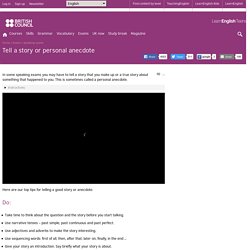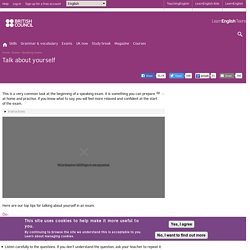

48 Questions That'll Make Small Talk Easier. Spot the Difference - Free Spot the Difference Puzzles. Group discussion skills. Group discussion skills Submitted by admin on 17 June, 2010 - 19:57 Group discussions occur in many different formats – from very informal ones between friends to highly structured and challenging discussions included as part of a selection process.

In both cases, there are a number of specific skills that we can help our students develop to become better able to contribute effectively to group discussions. Why teach group discussion skills? Types of discussion Useful sub-skills for students Setting up group discussions Giving and encouraging feedback Conclusion Why teach group discussion skills? Additionally, group discussions are increasingly being used in the job market during interviews and selection procedures. Types of discussion There are a variety of different types of discussions that occur naturally and which we can recreate in the classroom. You can then give them or elicit a list of phrases which they might use to interrupt politely (e.g.
Oral presentation. Melissa: Hi, everyone!

Today I would like to talk about how to become the most popular teen in school. Firstly, I think getting good academic results is the first factor to make you become popular since, having a good academic result, your teacher will award you in front of your schoolmates. Then, your schoolmates will know who you are and maybe they would like to get to know you because they want to learn something good from you. Secondly, I think participating in school clubs and student unions can help to make you become popular, since after participating in these school clubs or student union, people will know who you are and it can help you to make friends all around the school, no matter senior forms or junior forms. In conclusion, I think to become the most popular teen in school we need to have good academic results and also participate in school clubs and student union.
Kelvin: Good evening, everyone! But, should the government make it illegal? Tell a story or personal anecdote. Examiner: OK, Kelvin, so I’d like you to tell us a short personal story.

Here are the topics. Please take one. Kelvin: Tell me about a great surprise you had. Information gap activity. Examiner: So, you’re planning a trip to the cinema together.

You’ve got some information about films but your information’s not complete. Ask your partner to find out the missing information. Then, discuss together which films you’d like to see and choose a film to go and see together. Kelvin: So, the first film is Karemon but I don’t know the show times for it. So what … Melissa: Let me see, it’s at one o’clock in the afternoon and 6:30. Kelvin: So, what is the ticket price for adults? Melissa: It’s 80 dollars. Kelvin: And the next one is Mr and Mrs Jones. Melissa: They are both international spies. Kelvin: International spies, wow! Melissa: It’s a comedy. Kelvin: Comedy. Melissa: The robot has taken over the world. Discussion. Social networking can be too dangerous for young people and should only be available to adults.

Examiner: So, now we’re going to have a short discussion. You’ve got one minute to take notes and prepare together for a two-minute discussion. Remember to listen, take turns and explain your opinions. Kelvin: So, shall I start first? Describe a photo or picture. Talk about yourself. Examiner: Hi.

What’s your name? Kelvin: My name is Kelvin. Examiner: Kelvin, OK. So, Kelvin, I’m going to ask you a few questions. I’d like to ask you about your school. Kelvin: I think I like economics most because I can study different kinds of demand and supply theory and I can use it in my daily life to observe the market. Examiner: OK. Kelvin: Actually, I don’t like physics too much because I need to calculate many difficult questions and all those mathematics words.